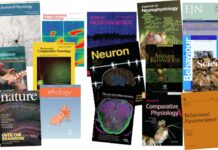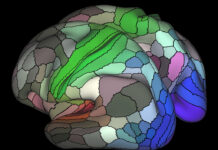Ioannidis Questions Strength of Psychology and Neuroscience Literature
Last week, well-known Stanford scientist John Ioannidis and his colleague Denes Szucs released a new analysis online. They examined research published in eighteen prominent...
New Study Raises Doubts About fMRI Neuroimaging Research
More than forty thousand papers have been published using functional magnetic resonance imaging (fMRI) technology to explore the brain. A new analysis of the common...
Neuroscientists Consider the Effect of the Gut on the Brain
A review article published in the International Journal of Neuropsychopharmacology summarizes the latest research on the role that microbiota in the gut play in...
Neuroplasticity and How the Brain Heals
For The Lancet, Jules Morgan reviews a new book, “The Brain’s Way of Healing,” by psychiatrist and psychoanalyst Norman Doidge. Doidge challenges current understandings...
Psychiatry Must Admit Failure of Current System and Take New Approach, Claims Stanford Neuroscientist
In an interview with the Scientific American, Stanford psychiatrist and neuroscientist, Amit Etkin, comments on the “wrong path” that psychiatry has taken as a...
New Study Finds Brain Changes in Newborns Exposed to Antidepressants
A fist of its kind neuroscience study, published this month in Cerebral Cortex, found changes in the brain electrical activity of infants exposed to SSRI antidepressants during pregnancy.
“Can Neuroscience Understand Donkey Kong, Let Alone a Brain?”
The Atlantic covers an experiment by two researchers who tried to use neuroscience techniques to understand the working of an old microprocessor. “Forget attention,...
Researcher Urges Caution When Applying Genetics to Psychiatry
In a review editorial for the journal Psychotherapy and Psychosomatics, neurobiology researcher Steven Dubovsky from the University at Buffalo argues against the adoption of...
Mindfulness Therapy May Be More Effective Without Antidepressants
While an estimated 74-percent of patients diagnosed with major depression receive a prescription for an antidepressant, new research reveals that mindfulness-based cognitive therapy (MBCT)...
“Constructing the Modern Mind”
Psychiatrist and historian George Makari tries to illuminate the historical evolution of our understanding of the conscious mind and how it relates to the...
“fMRI and False Positives: A Basic Flaw?”
For Discover Magazine, Neuroskeptic covers the pioneering work of Anders Eklund, which points to flaws in the analysis of psychiatric and neurological research using...
Mindfulness Therapy Can Prevent Depression Relapse, Review Finds
Mindfulness-based cognitive therapy (MBCT) may be more effective at reducing the risk of depressive relapse compared to current standard treatments with antidepressant drugs. A...
Omega-3 Screening for Psychiatric Symptoms?
There is a substantial body of evidence suggesting that not getting enough omega-3 fatty acids in your diet may be connected to a diverse array of psychiatric symptoms. In a new study published this month, psychiatrist Robert McNamara and Erik Messamore provide an overview of the evidence and call for screening of omega-3 deficiency in people experiencing symptoms associated with ADHD, depression, mood disorders, and psychosis.
“How Meditation Changes the Brain and Body”
In the New York Times Well Blog, Gretchen Reynolds covers a study published in Biological Psychiatry showing that mindfulness meditation, unlike a placebo, “can change...
Meditation and Exercise Reduce Depression Symptoms 40%
A combination of exercise and meditation done twice a week over two months may reduce depression symptoms by 40 percent, according to a new study published open-access this month in Translational Psychiatry. Following the eight-week intervention, the student participants that had previously been diagnosed with major depressive disorder (MDD) reported significantly less symptoms and ruminative thoughts and students without any such diagnoses also showed remarkable improvements.
Therapy Changes the Brain, Reduces Anxiety
After undergoing a nine-week cognitive behavioral therapy (CBT) treatment for social anxiety, patients show changes to both the physical structure of their brain and its activity, according to a new study published in Translational Psychiatry. The amygdala is most closely associated with the experience of fear and this study found that patients receiving CBT with reduced social anxiety had significant changes to this section of the brain.
The Genetics of Schizophrenia: A Left Brain Theory about a Right Brain Deficit in...
In recent months, two teams of researchers in the UK and the US published complementary findings about the epigenetic origins of schizophrenia that have scientific communities who indulge in ‘genetic conspiracy theories’ abuzz. While these results are intriguing, and no doubt involve pathbreaking research methodologies, this line of thought represents a decontextualized understanding both of the symptoms that are typically associated with schizophrenia, and their causes.
Psychiatrists Raise Doubts on Brain Scan Studies
In a review article for this month’s American Journal of Psychiatry, Daniel Weinberger and Eugenia Radulescu from John Hopkins University push back against the overreliance on MRI scans in recent psychiatric studies. While acknowledging that they both have contributed to this type of research in the past, the authors warn that “findings” from these studies “pose a serious risk of misinforming our colleagues and our patients.”
Madness and the Family, Part III: Practical Methods for Transforming Troubled Family Systems
We are profoundly social beings living not as isolated individuals but as integral members of interdependent social systems—our nuclear family system, and the broader social systems of extended family, peers, our community and the broader society. Therefore, psychosis and other forms of human distress often deemed “mental illness” are best seen not so much as something intrinsically “wrong” or “diseased” within the particular individual who is most exhibiting that distress, but rather as systemic problems that are merely being channeled through this individual.
Mindfulness Pain Relief Distinct from Placebo Effect
A new study demonstrates that the practice of mindfulness may ease pain in a way that is mechanistically distinct from the placebo effect. Research, published in the Journal of Neuroscience, found that mindfulness meditation not only outperformed placebo and fake meditation for pain relief but that it also activated different brain regions than the placebo treatments.
“An Accused Murderer Is Trying to Use a Brain Scan as Evidence He Couldn’t...
Philip Chism, who at 14-years-old brutally assaulted and murdered his teacher at Danvers high school in Massachusetts, has attempted to mount an insanity defense by producing brain scans that his expert witnesses have connected to schizophrenia. The judge has dismissed this evidence, however. “The inference the jury was asked to draw was that the volumetric value of the brain [is] consistent with schizophrenia is that the defendant has schizophrenia,” he said. “That is simply an impermissible inference for the jury to draw.”
The Ghost of Research Future
Two facts about Robert Califf are beyond question. He is an expert on clinical trials, who is already seen as a leading architect of the future of medical research. And as the New York Times put it, he has “deeper ties to the pharmaceutical industry than any FDA commissioner in recent memory”. A lot of senior figures in medicine support Califf in spite of his ties to Pharma. The guy is just so bright, and understands the nuts and bolts of drug research so well! Surely a person like this is more useful than some outsider who offers only a squeaky-clean resume, they argue.
Researchers Develop New Model for Understanding Depression
Acknowledging that current depression treatments are failing many people, researchers from Michigan State and MIT have developed a new model for understanding how multiple psychological, biological, social and environmental factors contribute to depression.
“Brains Aren’t Actually ‘Male’ or ‘Female,’ New Study Suggests”
New research on gender and the brain found that only a very small number of people have brains that are “entirely male, female, or intermediate between the two.” “The vast majority,” they write, have “a mosaic.”
Brain Imaging Reveals Psychiatric Disorders are Not Neurological Disorders
Some researchers have been arguing to reclassify all psychiatric disorders as diseases of the brain and nervous system, similar to epilepsy or Parkinson's disease. Neuroimaging research, however, reveals that psychiatric disorders appear to be distinct from neurological disorders, according to a new study published in this month’s issue of the British Journal of Psychiatry.











